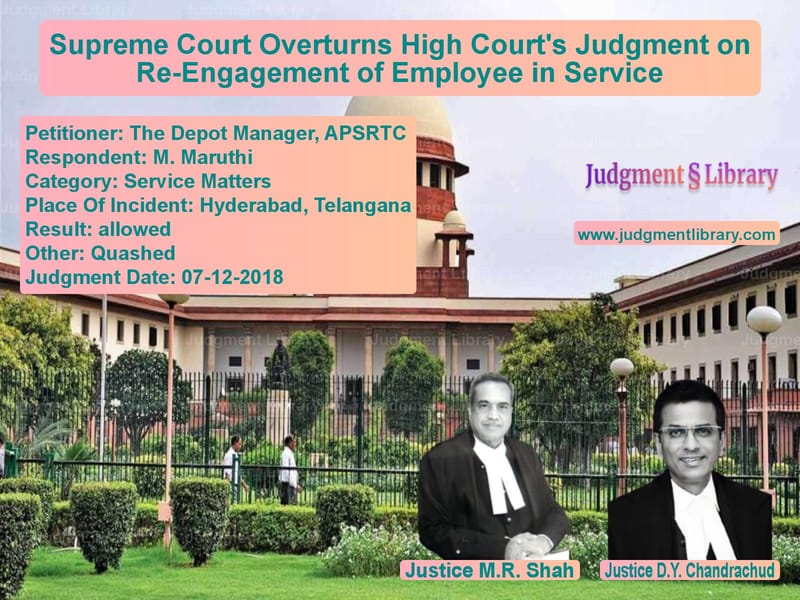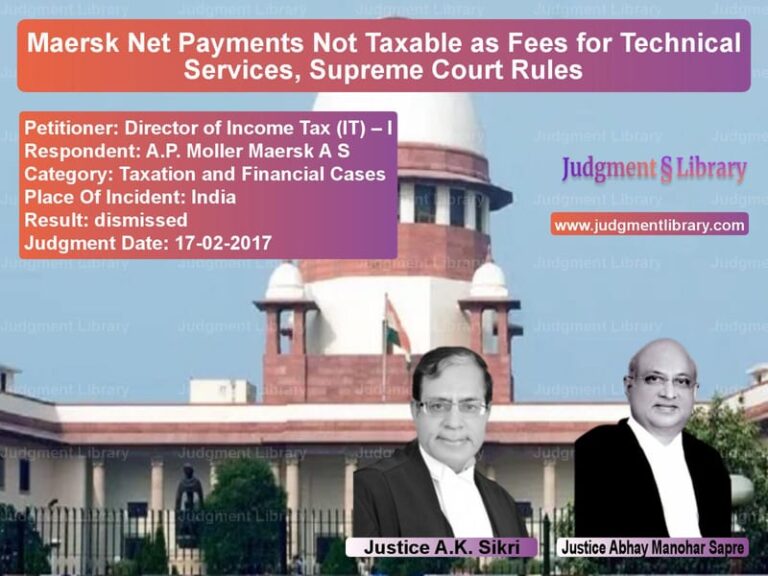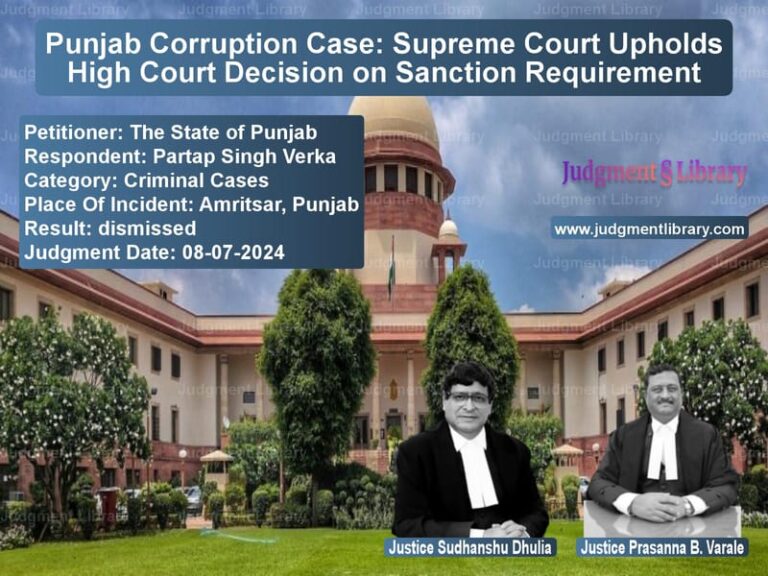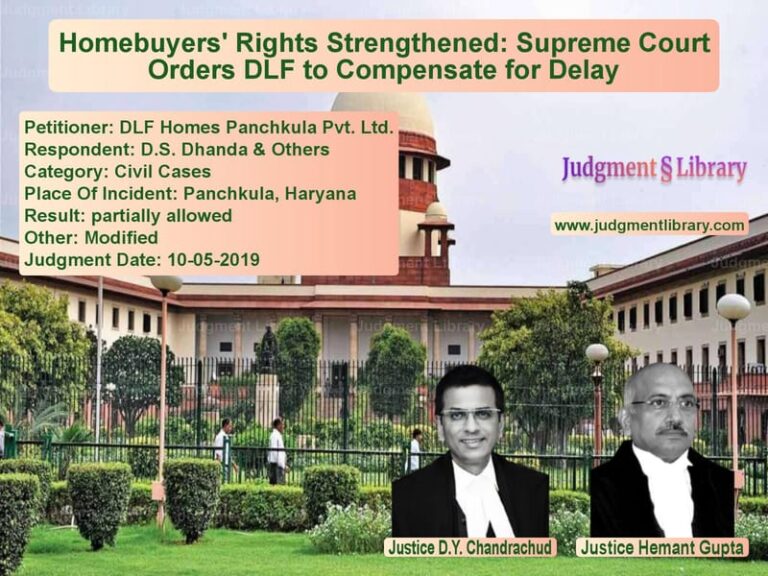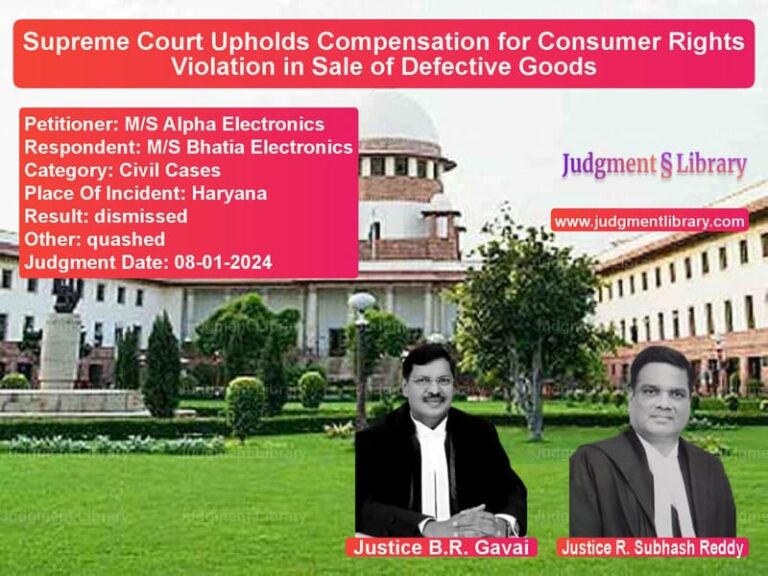Supreme Court Overturns High Court’s Judgment on Re-Engagement of Employee in Service
The case of The Depot Manager, APSRTC v. M. Maruthi is a landmark ruling on the re-engagement of employees who have been terminated following departmental proceedings, especially in light of statutory and judicial precedents. The Supreme Court examined the validity of the earlier judgments passed by the High Court and Single Judge concerning the re-engagement of a contract employee who had been dismissed after an inquiry.
Background of the Case
The respondent, M. Maruthi, was a contract conductor employed by the Andhra Pradesh State Road Transport Corporation (APSRTC) and worked in the Cantonment Depot, Hyderabad. He was dismissed from service following a departmental inquiry where he was found guilty. Despite the dismissal, Maruthi challenged his termination through an industrial dispute and approached the labor authorities. His industrial dispute was initially rejected, and the termination order was confirmed by the Tribunal.
The respondent then filed a writ petition before the Andhra Pradesh High Court. The learned Single Judge ruled in favor of the employee, ordering the APSRTC to re-engage Maruthi in service with continuity of service benefits, although without monetary compensation during the period of his absence. This judgment was affirmed by the Division Bench of the High Court, despite the distinguishing facts of the case related to the nature of the termination proceedings.
The APSRTC filed the present appeal before the Supreme Court, challenging the decision of the Division Bench and the Single Judge. The primary issue was whether the employee, who was terminated following a departmental inquiry, could be re-engaged with continuity of service under the judicial orders of the High Court.
Key Issues in the Case
- Whether the judgment of the High Court directing the re-engagement of the employee with continuity of service was justified.
- Whether the disciplinary proceedings and the employee’s right to re-engagement should have been considered based on the facts of the case, including the fact that the employee was dismissed after a departmental inquiry.
- Whether the Single Judge and Division Bench of the High Court erred by not considering the applicability of earlier decisions based on distinct facts.
Arguments by the Petitioner (APSRTC)
The appellant, APSRTC, represented by Senior Advocate Mr. Gourab Banerji, contended:
- The respondent’s termination was in accordance with proper departmental proceedings after a fair inquiry.
- Unlike the case in Writ Petition No. 2786 of 2012, where no inquiry was held, the respondent in this case was dismissed after holding a departmental inquiry and after the dismissal was confirmed by the Industrial Tribunal.
- The Single Judge’s reliance on the judgment in Writ Petition No. 2786 of 2012 was flawed as it did not account for the critical fact that a valid inquiry had been conducted in the present case.
- The re-engagement of the respondent without any monetary benefit was not warranted, and the appeal should be allowed.
Arguments by the Respondent (M. Maruthi)
The respondent, represented by Senior Counsel, countered:
- The employee was dismissed under the guise of a departmental inquiry that did not follow principles of natural justice.
- The learned Single Judge’s decision was consistent with the principles of fairness, as the employee should not be deprived of continuity of service when the employer is willing to provide a fresh employment opportunity.
- The Division Bench correctly upheld the Single Judge’s order, and the dismissal of the appeal was justified.
Supreme Court’s Observations
The Supreme Court critically examined the facts of the case, as well as the legal principles related to employment law and judicial re-engagement orders. The following observations were made:
1. Nature of the Employee’s Dismissal
The Court acknowledged that the respondent’s dismissal occurred after a departmental inquiry, where he was found guilty. However, the Court noted that this inquiry had been challenged and upheld by the Industrial Tribunal:
“The respondent’s dismissal was based on a properly conducted inquiry, and the findings were confirmed by the Industrial Tribunal. In such cases, there is no justification for the re-engagement of the employee without further legal processes being followed.”
2. The Applicability of Earlier Judgments
The Court examined the reliance placed by the learned Single Judge on an earlier decision where no inquiry had been conducted. The Court found that:
“In the earlier case, the employee had been terminated without any inquiry, and that fact distinguished it from the present case where a fair inquiry was held. Therefore, the Single Judge and Division Bench were wrong to rely on the earlier decision in such a context.”
3. The Role of the Industrial Tribunal’s Decision
The Court also pointed out that the respondent’s termination had been confirmed by the Industrial Tribunal, and the findings of the Tribunal could not be overlooked in judicial proceedings. The Court noted:
“The decision of the Industrial Tribunal, which upheld the dismissal, must be respected in the absence of any serious legal flaw. The courts cannot simply substitute their own judgment regarding the appropriateness of the termination.”
4. The High Court’s Approach
The Court criticized the High Court’s approach for failing to consider the facts of the case properly:
“The Division Bench of the High Court should have considered the specific facts of this case, particularly the fact that a proper inquiry had been held before the respondent was dismissed from service. The reliance on an earlier judgment without addressing the material facts was incorrect.”
Supreme Court’s Judgment
The Supreme Court ruled:
- The High Court’s order to re-engage the respondent was set aside.
- The appeal filed by the appellant (APSRTC) was allowed.
- The respondent’s claim for continuity of service was dismissed as it was not supported by the findings of the Industrial Tribunal.
- The order of re-engagement with continuity of service and without monetary benefits was quashed.
Impact of the Judgment
This judgment has significant implications for employment law, particularly regarding the re-engagement of employees after termination. Key takeaways include:
- Upholding Fair Termination: The decision underscores that a fair and justifiable termination after a proper inquiry cannot be easily overturned or disregarded by judicial orders.
- Clarifying Judicial Precedent: The ruling makes it clear that judicial authorities must consider the specific facts of each case, particularly when relying on earlier precedents.
- Respecting Tribunal Decisions: The Court emphasized the importance of respecting the decisions of labor tribunals in disputes related to employment termination.
- Protecting Employers’ Rights: Employers are entitled to defend the legality of their actions in cases involving employee discipline and termination.
Conclusion
The Supreme Court’s decision in The Depot Manager, APSRTC v. M. Maruthi reaffirms the importance of a fair disciplinary process and the limitations on judicial intervention in employment matters. By setting aside the High Court’s order for re-engagement, the Court emphasized the need to respect the findings of the Industrial Tribunal and the fairness of termination procedures. This case will serve as an important reference for future cases involving employment disputes and the rights of employees who have been terminated after due process.
Petitioner Name: The Depot Manager, APSRTC.Respondent Name: M. Maruthi.Judgment By: Justice M.R. Shah, Justice D.Y. Chandrachud.Place Of Incident: Hyderabad, Telangana.Judgment Date: 07-12-2018.
Don’t miss out on the full details! Download the complete judgment in PDF format below and gain valuable insights instantly!
Download Judgment: The Depot Manager, A vs M. Maruthi Supreme Court of India Judgment Dated 07-12-2018.pdf
Direct Downlaod Judgment: Direct downlaod this Judgment
See all petitions in Employment Disputes
See all petitions in Termination Cases
See all petitions in Public Sector Employees
See all petitions in Judgment by Mukeshkumar Rasikbhai Shah
See all petitions in Judgment by Dhananjaya Y Chandrachud
See all petitions in allowed
See all petitions in Quashed
See all petitions in supreme court of India judgments December 2018
See all petitions in 2018 judgments
See all posts in Service Matters Category
See all allowed petitions in Service Matters Category
See all Dismissed petitions in Service Matters Category
See all partially allowed petitions in Service Matters Category

